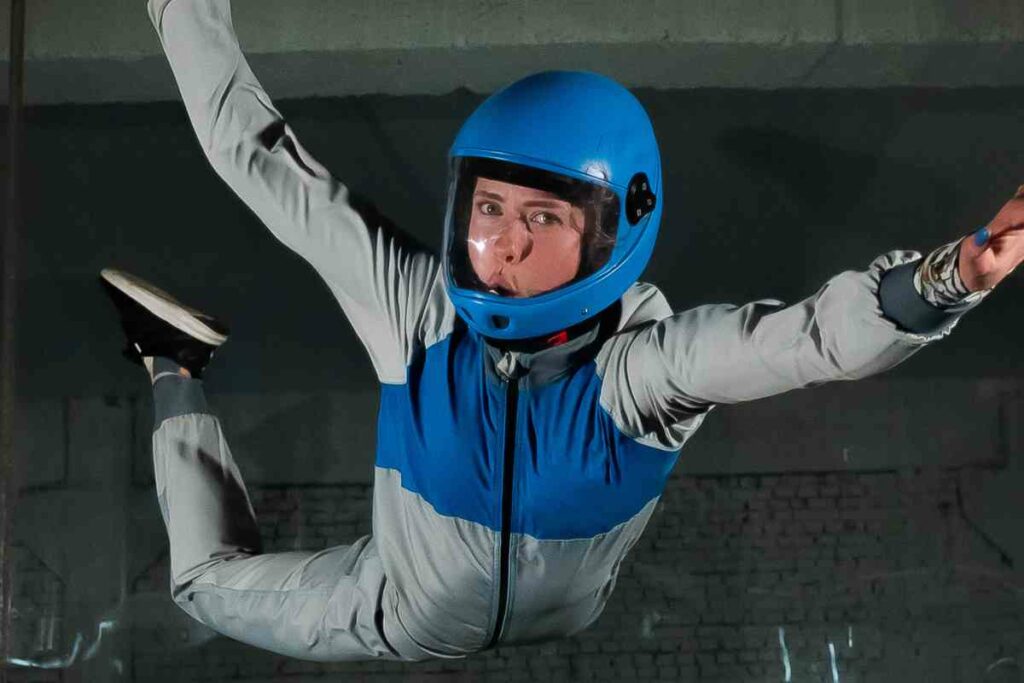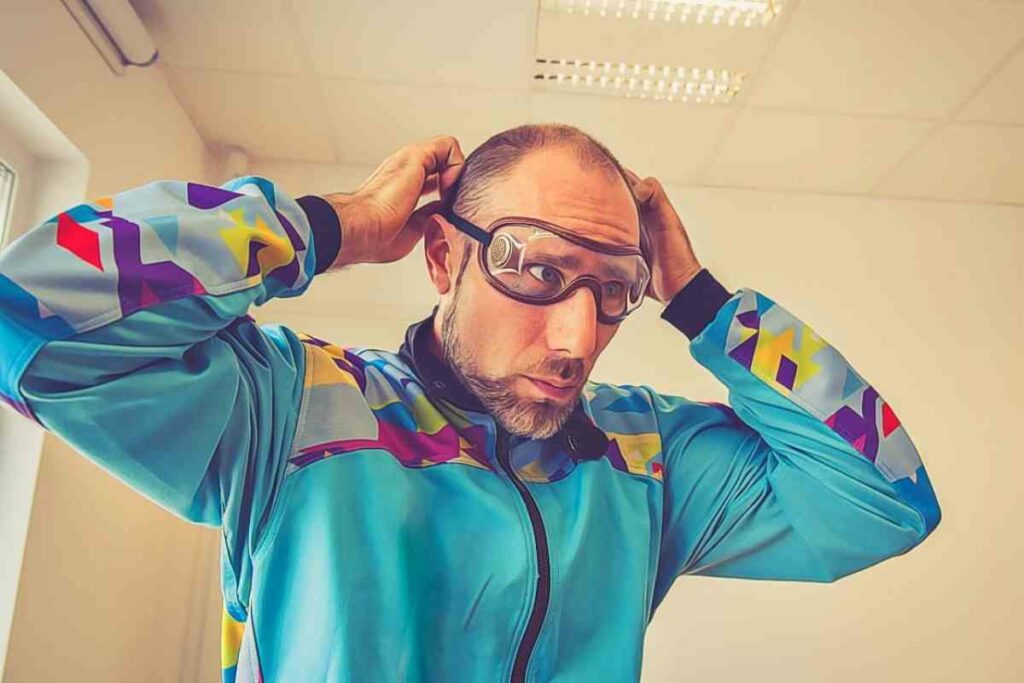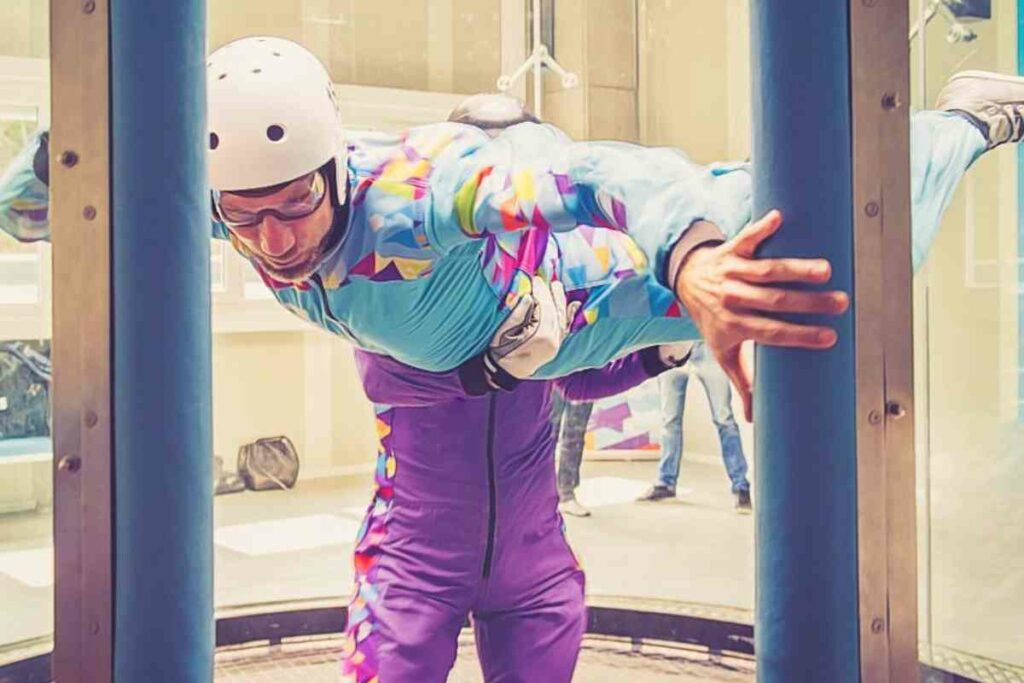You’ve been eagerly planning an indoor skydiving adventure, but unfortunately, your attempts to pump up at the gym have left you with a sore shoulder.
Can you still safely enjoy the thrill of simulated free-fall?
We investigate whether indoor skydiving is possible with a bum shoulder.
Can You Indoor Skydive With a Sore Shoulder?
If you have a sore shoulder, it’s not recommended to indoor skydive due to the arm and shoulder movements involved in the activity, which can worsen pain and limit control.
It’s best to wait until your shoulder has fully healed before attempting indoor skydiving to avoid potential injury and discomfort, ensuring a safe and enjoyable experience.
Read before you go – Can You Indoor Skydive If You Have a Medical Condition?
Even though indoor skydiving does not involve jumping out of an actual airplane, it still requires your arms and shoulders to be in good condition.
During an indoor skydiving experience, you’ll need to raise your arms above your head and keep them there for the duration of the flight.
This action would put extra pressure on a sore shoulder, increasing pain and making it difficult to control your movements.

Furthermore, if something were to go wrong during the simulated freefall experience – which happens at high speeds in a vertical wind tunnel – then you could easily make things worse by landing awkwardly on your injured shoulder.
To avoid any potential injury or discomfort when taking part in this thrilling activity, it’s best to wait until your shoulder is no longer sore before attempting an indoor skydiving session.
Once all is well again, get ready for some adrenaline-pumping fun that will leave you feeling like a superstar!
Want to know more? Get started with our beginner’s guide to indoor skydiving, packed with valuable information to help you understand and enjoy this thrilling activity.
Is Indoor Skydiving Hard on Your Body?
Indoor skydiving is a thrilling experience that simulates the sensation of jumping from an airplane and free-falling in a vertical wind tunnel.
It requires no previous experience or certification, making it accessible to anyone who wants to fly.
But is indoor skydiving hard on your body? The answer depends on several factors, such as your physical condition, age, weight, and any underlying health conditions you may have.
Here are some things to consider:
Pros:
- Indoor skydiving can be a low-impact exercise that engages many muscle groups in your body
- It can improve your balance, coordination, flexibility, and overall fitness level
- You don’t need to worry about altitude sickness or weather conditions since you’re indoors
- You will receive instructions from trained professionals who will teach you proper techniques for safe flying
Cons:
- Some people may feel dizzy, nauseous, or disoriented while flying due to the change in air pressure inside the wind tunnel
- People with back problems, heart conditions, or pregnant women should avoid indoor skydiving because of potential safety risks
- Some people may slip during landing which could cause minor injuries like strains and bruises
Overall, indoor skydiving isn’t too taxing on one’s body but if there are pre-existing medical issues they should avoid it.
As long as you’re in good health and follow the instructions given by your instructor, indoor skydiving should be a fun and safe activity that anyone can enjoy without fear of hurting their body.
Precautions and Recommendations When Indoor Skydiving With a Sore Shoulder
If you have a sore shoulder and want to try indoor skydiving, there are precautions and recommendations that you need to consider.
Although this activity is relatively safe compared to traditional skydiving, the pressure and wind can still strain your shoulder muscles.
Here are some precautions and recommendations when indoor skydiving with a sore shoulder:
- Consult A Doctor: Before attempting any physical activity, it’s essential to consult your doctor to get an accurate diagnosis of your shoulder condition.
- Inform Your Instructor: Make sure you inform the instructor about your shoulder pain before getting into the flight chamber so they can offer modifications or take necessary precautions.
- Avoid Excessive Activities: Try not to engage in activities that will put too much stress on your injured arm or avoid physical activities entirely if necessary.
- Use Proper Technique And Form: Ensure proper body alignment during each skydive session as improper technique puts pressure on already sensitive areas causing further injury or worsening conditions.
In Conclusion
It’s important to listen to your body and stop if your shoulder is hurting from indoor skydiving.
While indoor skydiving with a sore shoulder is technically possible, it may not be the safest or most comfortable option.
Take care of yourself first and you’ll have an even better experience next time you hit the wind tunnel!







